定语从句解释大全
定语从句详解
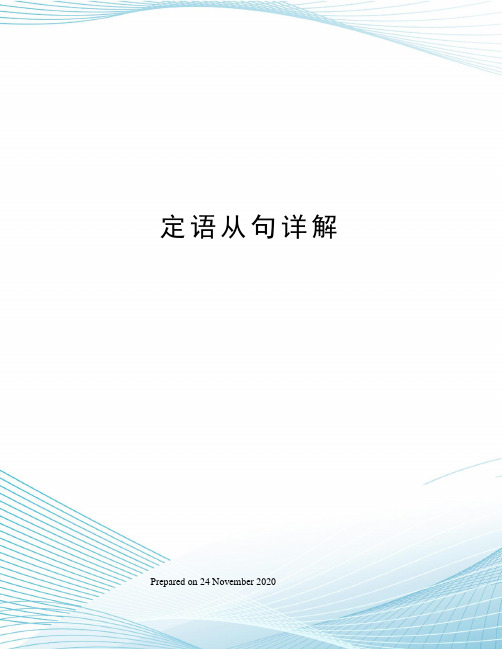
定语从句详解 Prepared on 24 November 2020定语从句(AttributiveClauses)一:定义 (AttributiveClauses):在复合句中,由关系词(关系代词或关系副词)引导的,用作定语来修饰主句的某个名词或代词(先行词)或者整个句子的形容词性从句(定语从句),一般紧跟在它所修饰的先行词后面。
定语从句三要素:先行词,关系词和从句1)先行词:被定语从句修饰的词2)关系词:引导定语从句,代替先行词在从句中充当成分的词3)从句:既然为句,就有人称,时态,数的变化。
二:关系词:关系代词和关系副词关系代词:who(指人),whom,whose,that,which,as;在从句中做主语,宾语,或定语,指人或物关系副词:when(时间),where(地点),why(原因);在从句中依次做时间,地点,原因状语,可以用介词(in,on,for,during等)+ which替换★补充1:人称代词:指直接指代人或者事物的代词★补充2:物主代词:表示所有关系的代词叫做物主代词,也叫人称代词的所有格★归纳表格(1)—关系代词★归纳表格(2)—关系代词★归纳表格(3)—关系代词★归纳表格(4)—关系副词3:具体用法及实例关系代词1)Who:who在从句中主要作主语,在非正式语体里who还可以作从句中的宾语,但不能放在介词后(1)主语分解:The man is a teacher. The man is speaking in the classroom.合并:The man who is speaking in the classroom is a teacher(2)宾语分解:The man is my friend. You met the man in the street just now.合并:The man who(whom)you met in the street just now(可后置) is my friend.(3)概括He is the man who wants to see you.He is the man who I saw in the park yesterday.2)Whom:在从句中作宾语,可放在介词后(1)宾语分解:The woman is a doctor. They want to visit the woman.合并: The woman whom they wanted to visit is a doctor.(2)概括He is the man (whom) I saw in the park yesterday.小结:Who whom 都可在定语从句中充当宾语成分,但whom作为宾语,较为正式;而who作为宾语使用时,常用语非正式语中;二者若同时出现而且充当相同成分,whom优先。
(完整版)定语从句详解+例句
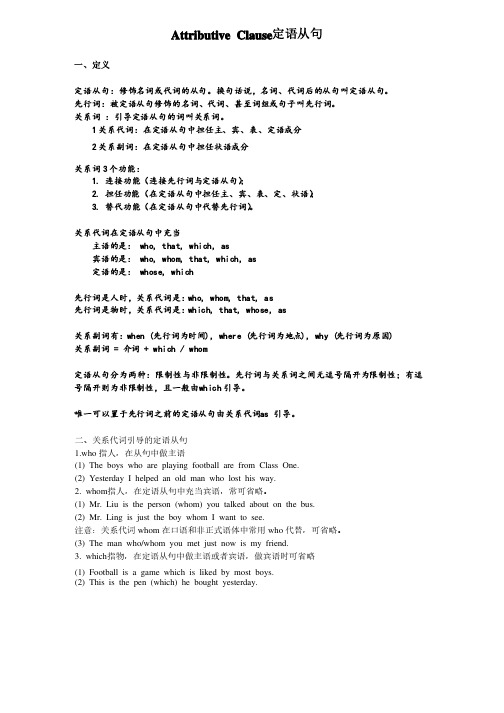
Attributive Clause定语从句一、定义定语从句:修饰名词或代词的从句。
换句话说,名词、代词后的从句叫定语从句。
先行词:被定语从句修饰的名词、代词、甚至词组或句子叫先行词。
关系词:引导定语从句的词叫关系词。
1关系代词:在定语从句中担任主、宾、表、定语成分2关系副词:在定语从句中担任状语成分关系词3个功能:1. 连接功能(连接先行词与定语从句);2. 担任功能(在定语从句中担任主、宾、表、定、状语);3. 替代功能(在定语从句中代替先行词)。
关系代词在定语从句中充当主语的是: who, that, which, as宾语的是: who, whom, that, which, as定语的是: whose, which先行词是人时,关系代词是:who, whom, that, as先行词是物时,关系代词是:which, that, whose, as关系副词有:when (先行词为时间), where (先行词为地点), why (先行词为原因)关系副词 = 介词 + which / whom定语从句分为两种:限制性与非限制性。
先行词与关系词之间无逗号隔开为限制性;有逗号隔开则为非限制性,且一般由which引导。
唯一可以置于先行词之前的定语从句由关系代词as 引导。
二、关系代词引导的定语从句1.who指人,在从句中做主语(1) The boys who are playing football are from Class One.(2) Yesterday I helped an old man who lost his way.2. whom指人,在定语从句中充当宾语,常可省略。
(1) Mr. Liu is the person (whom) you talked about on the bus.(2) Mr. Ling is just the boy whom I want to see.注意:关系代词whom在口语和非正式语体中常用who代替,可省略。
(完整版)定语从句讲解

1一、定语从句概述定语可以由形容词、名词、代词、数词、分词、副词、不定式以及介词短语 等来担任,也可以由一个句子来担任。
在句子中起定语作用的从句称为定语 从句。
定语从句在句中的作用相当于形容词,故又称为形容词性从句。
被定 语从句修饰的名词叫先行词,引导定语从句的词叫关系词。
二 关系词的用法。
关系词可分为关系代词和关系副词。
关系词指代先行词,放在先行词与 定语从句之间起连接作用,同时又充当定语从句中的某一种成分(主语、宾 语、状语等)。
引导定语从句的关系代词有"at ,who ,whom ,whose ,which;关系副词有 when ,where ,why 等。
关系词在句子中的指代作用及成分如下表 1.关系代词的用法(1) who, whom 的用法二者都用于指人。
who 在定语从句中作主语、宾语;whom 在定语从句中 作宾语。
在现代英语里,有时who 也可代替whom 在从句中作宾语。
作 宾语的关系代词who ,whom 可以省略(介词后作宾语的关系代词除外)。
She was the one who did most of the talking 。
大部分时间都是她在说话。
(作主语) The boy who I know studies best in his class.我认识的那个男孩在班上学习最好。
(作宾语)I happened to meet the professor (who/whom) I got to know at a party. 我碰巧遇见了那位在一次聚会上认识的教授。
(作宾语,whom 可用who 代替) whom 在从句中作介词的宾语,且介词提到whom 前面时,不能用who 代替。
Yesterday I came across a few friends with whom I went to the park .昨天 我碰见了几个朋友,我和他们一起去了公园。
高中定语从句全面详细讲解
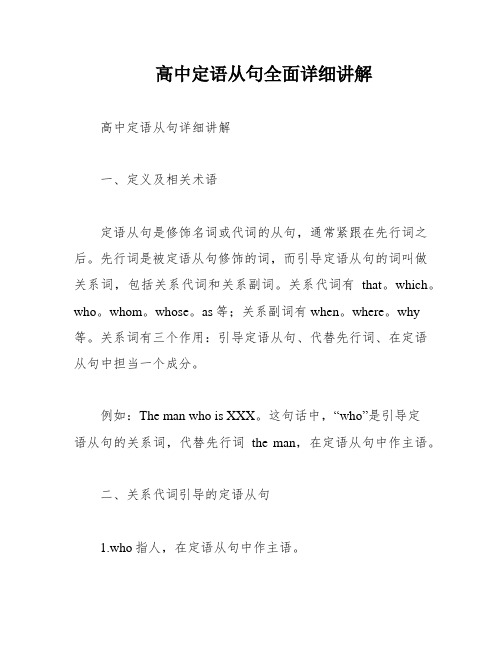
高中定语从句全面详细讲解高中定语从句详细讲解一、定义及相关术语定语从句是修饰名词或代词的从句,通常紧跟在先行词之后。
先行词是被定语从句修饰的词,而引导定语从句的词叫做关系词,包括关系代词和关系副词。
关系代词有that。
which。
who。
whom。
whose。
as等;关系副词有when。
where。
why 等。
关系词有三个作用:引导定语从句、代替先行词、在定语从句中担当一个成分。
例如:The man who is XXX。
这句话中,“who”是引导定语从句的关系词,代替先行词the man,在定语从句中作主语。
二、关系代词引导的定语从句1.who指人,在定语从句中作主语。
例如:XXX are from Class One。
正在踢足球的男孩是一班的。
Those who want to go to the museum must be at the school gate at 7 XXX。
想去博物馆的人必须在明晨7点到大门口集合。
XXX I helped an old man who had lost his way。
昨天我帮助了一位迷路的老人。
That is the XXX。
那就是教我们物理的老师。
2.whom指人,在定语从句中做宾语,常可省略。
例如:Mr。
Liu is the person (whom) you talked about on the bus。
XXX就是你们在公共汽车上谈论的那个人。
Li Ming is just the boy (whom) I want to see。
XXX正是我想要见的男孩。
The professor (whom) you are waiting for has come。
你正在等的教授已经来了。
The girl who is often praised by the teacher is our monitor。
She is a responsible and diligent student who always sets a good example for the rest of the class.The man you just met is my old friend。
最全的定语从句讲解

1. Handsome boys=the boys who are handsomeBeautiful flowers=the flowers which are beautiful2.定义定语从句(Attributive Clauses):由关系词(关系代词或关系副词)引导的从句,其作用是作定语修饰主句的某个名词和代词,相当于形容词,所以又称为形容词性从句,一般紧跟在它所修饰的先行词后面。
被修饰的名词,词组或代词叫做先行词。
关系词常有3个作用:①引导定语从句。
②代替先行词。
③在定语从句中担当一个成分。
3.分类定语从句:限制性定语从句和非限制性定语从句4.关系词以及基本用法1)介词后面的关系词不能省略。
2)that前不能有介词。
3)某些在从句中充当时间,地点或原因状语的"介词+关系词"结构可以同关系副词when 和where 互换。
例如:This is the house in which I lived two years ago. 这是我两年前住过的房子。
This is the house where I lived two years ago.Do you remember the day on which you joined our club?还记得你加入我们俱乐部的那一天吗?Do you remember the day when you joined our club?5. whom在定语从句中只指人,做宾语,可用who或that代替,但后边的介词提前时,只用whom,也可以省略,例如:Do you know the man (whom/who/that) the teacher is talking to?= Do you know the man to whom the teacher is talking?She is the person (whom/who/that) you should turn to for help.= She is the person to whom you should turn for help6. Whose 用来指人或物,(只用作定语, 若指物,它还可以同of which互换)(1) They rushed over to help the man whose car had broken down. 那人车坏了,大家都跑过去帮忙。
定语从句超详细讲解
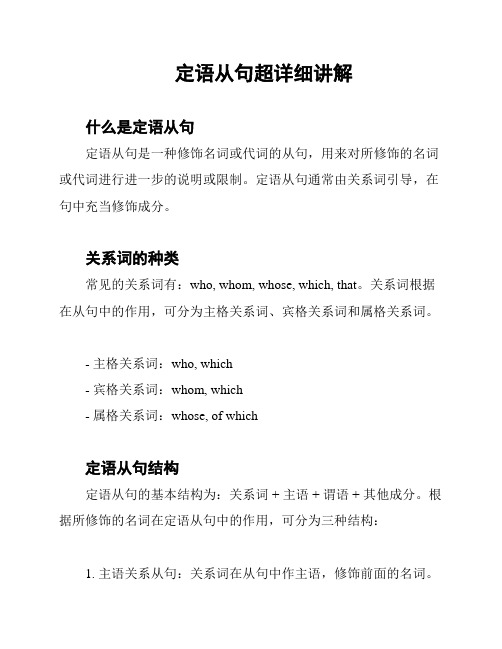
定语从句超详细讲解什么是定语从句定语从句是一种修饰名词或代词的从句,用来对所修饰的名词或代词进行进一步的说明或限制。
定语从句通常由关系词引导,在句中充当修饰成分。
关系词的种类常见的关系词有:who, whom, whose, which, that。
关系词根据在从句中的作用,可分为主格关系词、宾格关系词和属格关系词。
- 主格关系词:who, which- 宾格关系词:whom, which- 属格关系词:whose, of which定语从句结构定语从句的基本结构为:关系词 + 主语 + 谓语 + 其他成分。
根据所修饰的名词在定语从句中的作用,可分为三种结构:1. 主语关系从句:关系词在从句中作主语,修饰前面的名词。
- 例:The book which is on the table is mine.(在桌子上的那本书是我的。
)2. 宾语关系从句:关系词在从句中作宾语,修饰前面的名词。
- 例:She has a brother whom I have never met.(她有个兄弟我从未见过。
)3. 定语关系从句:关系词在从句中作定语,修饰前面的名词。
- 例:I live in a house whose roof is red.(我住在一座房子里,它的屋顶是红色的。
)定语从句的使用注意事项- 关系词指代的是先行词,要保持一致性。
例如,主格关系词引导的从句,先行词也应该是人;宾格关系词引导的从句,先行词也应该是人或物;属格关系词引导的从句,先行词也应该是有所属关系的事物。
- 关系词在从句中可省略,但要根据上下文的需要决定是否省略。
定语从句的练题1. The girl _______ is my sister. (who/whom/which/that)2. The man _______ I talked to is the boss. (who/whom/which/that)3. She is the girl _______ mother works at the hospital.(who/whom/whose/which/that)4. The car _______ is parked outside is mine. (who/which/that)5. The book _______ you borrowed from the library is overdue. (whose/which/that)答案:1. who2. whom3. whose4. that5. which以上就是定语从句的超详细讲解。
(完整版)定语从句语法详解

定语从句语法专题(Attributive Clauses)教案一. 定语从句的概述:1.定语从句:在复合句中,修饰某一名词或代词的从句叫定语从句。
在句中做定语,被修饰的名词或代词,叫做先行词。
从句通常放在先行词之后,由关系词(关系代词或关系副词)引导。
其作用是作定语修饰主句的某个名词性成分,相当于形容词,所以又称为形容词性从句,一般紧跟在它所修饰的先行词后面。
eg She is the girl(who got the first prize.)girl先行词who充当从句主语, 从句做定语修饰girlThis is the boy who broke the window.这就是打破窗子的孩子。
the boy是先行词, who broke the window是限制性定语从句, 明确指出theboy是打破窗子的那个孩子,who 在从句中充当主语That is the house where he lived ten years ago.He is the man who/that lives next door.He is the man who I want to see.先行词关系词定语从句复合句: 是由一个主句和一个或一个以上的从句构成的句子, 复合句中的主句和从句都具有完整的的主语和谓语, 主句是复合句的主体, 可以独立存在, 从句需要有一个连词引导, 是修饰说明主句的, 不能独立存在, 根据在句中的不同作用, 从句可以分为三类: 定语从句, 名词性从句, 状语从句。
二. 引导定语从句的关系词有两大类:1.关系词:引导定语从句的关联词称为关系词,关系词有关系代词和关系副词。
关系代词: that, who, whom, whose, which, as(主, 宾, 定)关系副词: when, where, why.(状语)2.关系词的作用:(1)引导定语从句, 在先行词和定语从句之间起连接作用;(2)代替先行词在句中充当成分。
(完整版)定语从句知识点大全
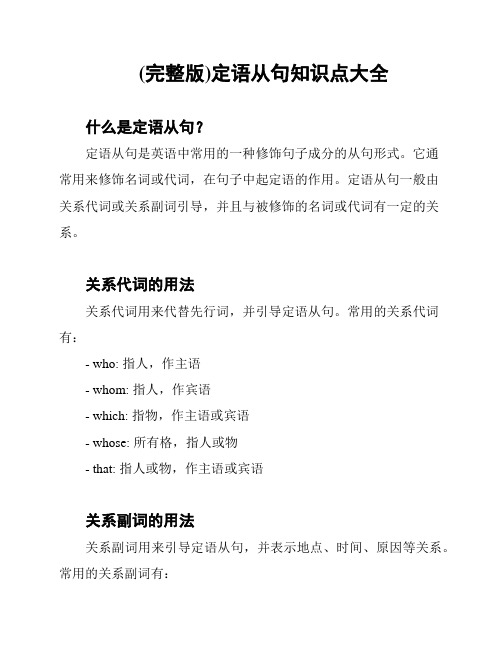
(完整版)定语从句知识点大全什么是定语从句?定语从句是英语中常用的一种修饰句子成分的从句形式。
它通常用来修饰名词或代词,在句子中起定语的作用。
定语从句一般由关系代词或关系副词引导,并且与被修饰的名词或代词有一定的关系。
关系代词的用法关系代词用来代替先行词,并引导定语从句。
常用的关系代词有:- who: 指人,作主语- whom: 指人,作宾语- which: 指物,作主语或宾语- whose: 所有格,指人或物- that: 指人或物,作主语或宾语关系副词的用法关系副词用来引导定语从句,并表示地点、时间、原因等关系。
常用的关系副词有:- where: 表示地点- when: 表示时间- why: 表示原因定语从句的形式定语从句可以是限制性的,也可以是非限制性的。
限制性定语从句限制性定语从句是对先行词进行限定和修饰的从句,如果去掉,整个句子的意思就不完整或失去了关键信息。
限制性定语从句通常使用关系代词和关系副词引导,关系代词在从句中作主语或宾语。
非限制性定语从句非限制性定语从句是对先行词进行补充说明,它对整个句子的意思并不具有限制作用,就算去掉也不会影响主句的表达。
非限制性定语从句通常使用逗号将其和主句隔开,关系代词在从句中作主语或宾语。
定语从句的位置定语从句可以放在先行词之后,也可以放在先行词之前。
定语从句的例句- I have a friend who lives in New York.(非限制性定语从句)- The book that you borrowed is on the desk.(限制性定语从句)以上就是关于定语从句的一些基本知识点。
定语从句在英语语法中是一个重要的内容,掌握好定语从句的用法可以有效地提升我们的写作水平。
希望本文对您有所帮助!。
- 1、下载文档前请自行甄别文档内容的完整性,平台不提供额外的编辑、内容补充、找答案等附加服务。
- 2、"仅部分预览"的文档,不可在线预览部分如存在完整性等问题,可反馈申请退款(可完整预览的文档不适用该条件!)。
- 3、如文档侵犯您的权益,请联系客服反馈,我们会尽快为您处理(人工客服工作时间:9:00-18:30)。
【本讲教育信息】一. 教学内容:定语从句考点1二. 重难点讲解:1. The factory was built in a secret place, around ______ high mountains.A. which wasB. it wasC. which wereD. them were陷阱:容易误选A或B,将A、B中的which 和it 误认为是其后句子的主语。
分析:最佳答案是C,around which were high mountains 是一个由“介词+which”引出的非限制性定语从句,而在该从句中,主语是high mountains,around which 是表语,所以句子谓语应用复数were,而不是用单数was。
请做以下类例题目(答案均为C):(1)Yesterday we visited a modern hospital, around _______ some fruit shops.A. which isB. it isC. which areD. them are(2)The murder happened in an old building, beside ______ the city police station.A. which areB. it isC. which isD. them are(3)Next month we’ll move to a new building, next to _______ a nice restaurants where we can have Chinese food.A. which areB. it isC. which isD. them are2. A man with a bleeding hand hurried in and asked, “Is there a hospital around ______ I can get some medicine for my wounded hand?”A. thatB. whichC. whereD. what陷阱:容易误选B,认为around 是介词,选which 用以代替前面的名词hospital,在此用作介词around 的宾语。
分析:最佳答案为C。
以上语法分析并不算错,但问题是,照此分析,此句的意思即为:有没有这样一个医院,我在它的附近可以买药治我的手伤?这样的语境显然有点不合情理,因为人们通常是在医院里面治伤,而不是在医院附近治伤。
此题选C 的理由是:句中的around 不是介词,而是副词,意为“在附近”;其后的where 引导定语从句用以修饰其前的地点名词hospital,句意为:附近有没有一家医院,我可以去治我的手伤?3. _____ is known to everybody, the moon travels round the earth once every month.A. ItB. AsC. ThatD. What陷阱:容易误选A,认为此处应填一个形式主语。
分析:最佳答案是B。
as 引导的是一个非限制性定语从句。
比较下面一题:_______ is known to everybody that the moon travels round the earth once every month.A. ItB. AsC. ThatD. What此题答案选A,it 为形式主语,真正的主语是后面的that 从句。
再比较下面一组题,其中第(1)题选B,第(2)题选D:(1)______ is mentioned above, the number of the students in senior school is increasing.A. WhichB. AsC. ThatD. It(2)______ is mentioned above that the number of the students in senior school is increasing.A. WhichB. AsC. ThatD. It4. David is such a good boy _______ all the teachers like.A. thatB. whoC. asD. whom陷阱:此题容易误选A,许多同学一看到题干中的such,再联系到选项中的that,便认为这是考查such … that …句式。
况且,这样理解意思也还通顺。
分析:最佳答案为C,不是A,因为在such … that … (如此……以至……)结构中,that 引导的是结果状语从句,并且that 在从句中不充当句子成分,若在上句填入such … that …,句末的动词like 缺宾语。
选C的理由如下:as 用作关系代词,用以引导定语从句,修饰其前的名词boy,同时as 在定语从句中用作动词like 的宾语,句意为“所有老师都喜欢的一位好男孩”。
有的同学可能还会问,假若选A,能否将其后的that 视为引导定语从句的关系代词呢?不能,因为当先行词受到such 的修饰时,其后的定语从句应用关系代词as 来引导,而不用that。
比较下面一题,答案为A,因为like 后有自己的宾语him:David is such a good boy _______ all the teachers like him.A. thatB. whoC. asD. whom请再做以下试题(答案选D):It was not such a good dinner _______ she had promised us.A. likeB. thatC. whichD. as5. The buses, most of _______ were already full, were surrounded by an angry crowd.A. thatB. itC. themD. which陷阱:容易误选C,用them 代指the buses。
分析:最佳答案是D。
most of which were already full 为非限制性定语从句,修饰the buses。
类似地,以下各题也选D:(1)His house, for _______ he paid $10, 000, is now worth $50, 000.A. thatB. itC. themD. which(2)Ashdown forest, through _______ we’ll be driving, isn’t a forest any longer.A. thatB. itC. themD. which(3)This I did at nine o’clock, after _______ I sat reading the paper.A. thatB. itC. themD. which类似地,以下各题选whom,不选them:(4)George, with _______ I played tennis on Sundays, was a warm-hearted person.A. thatB. himC. themD. whom(5)Her sons, both of ______ work abroad, will come back home this summer.A. thatB. whoC. themD. whom(6)I met the fruit-pickers, several of _______ were still university students.A. thatB. whoC. themD. whom【典型例题】1. All of the flowers now raised here have developed from those _______ in the forest.A. once they grewB. they grew onceC. they once grewD. once grew2. In the office I never seem to have time until after 5:30 pm, _____ many people have gone home.A. thatB. whichC. whose timeD. by which time3. Is this the reason _______ at the meeting for his carelessness in his work?A. he explainedB. what he explainedC. how he explainedD. why he explained4. Luckily, we’d brought a road map without ______ we would have lost our way.A. itB. thatC. thisD. which5. When he was working there he caught a serious illness from _____ efforts he still suffers.A. whichB. thatC. whoseD. what6. It’s said that he’s looking for a new job, one ______ he can get more money to support his family.A. whenB. whereC. thatD. which7. We are living in an age ______ many things are done on computer.A. whichB. thatC. whoseD. when8. The little time we have together we’ll try _____ wisely.A. spending itB. to spend itC. to spendD. spending that9. The old building, behind _______ was a famous church, was _______ we used to work.A. that, the placeB. it, the placeC. which, whereD. what, where10. We will be shown around the city: schools, museums, and some other places, _______ other visitors seldom go.A. whatB. whichC. whereD. when11. The modern history of Italy dates from 1860, ______ the country became united.A. whenB. ifC. sinceD. until12. All of the flowers now raised here have developed from those _____ in the forest.A. once they grewB. they grew onceC. that once grewD. once grew13. You could see the runners very well from ______ we stood.A. whichB. whereC. thatD. when14. Recently I bought an ancient Chinese vase, _______ was very reasonable.A. which priceB. the price of whichC. its priceD. the price of whose答案与解析:1. 选C。
